Warhammer Online Q&A
We chat with Warhammer Online Ltd and Climax Nottingham about their ambitious massively multiplayer interpretation of the popular tabletop fantasy universe.
Games Workshop, the team behind the popular Warhammer and Warhammer 40,000 (40K) tabletop games, has been in the business of developing fantasy worlds for more than 20 years--worlds where players face off head-to-head as commanders of their own squads of hand-painted soldiers. And during this time, the company has introduced other games, including the small-scale skirmishes of Mordheim and Necromunda, as well as the larger regiment battles of Warmaster and the space-opera warfare of Space Hulk.
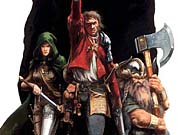
In the early '80s, Games Workshop introduced Warhammer Fantasy Role-Play, its miniature-free role-playing game system, which lets players create original characters to explore the depths of the Warhammer fantasy world. Much of the inspiration, character, and feel of the Warhammer world emerged from the ideas and writings of Rick Priestley and the nightmarish visions of artist John Blanche. In this dark, gritty, gothic-medieval setting, brutish orcs, high-fantasy elves, and Arthurian-derived Bretonnian knights meet face-to-face with more distinctly proprietary characters and races, such as the race of ratmen known as the skaven and the deranged witch-hunters.
While tabletop wargaming may still be perceived as something of a niche market, Games Workshop has also recently delved into the creation of a game with more mass-market appeal--specifically, a wargame based on New Line Cinema's recent Lord of the Rings franchise. The success of this game has spurred Games Workshop to approach the more widespread audience that its games now command with its next endeavor--Warhammer Online.
Games Workshop-licensed games have been the source material for PC and console games for years, such as Space Hulk, Warhammer: Shadow of the Horned Rat, and Warhammer: Dark Omen. What's different about Warhammer Online is that rather than being a licensed product, it will be developed directed by Games Workshop.
We had the chance to chat with Robin Dews of Games Workshop's Warhammer Online Ltd. division and Matt Sansam, executive producer of Climax Nottingham, to discuss the background behind the Warhammer Online project, where it is now, and where it will be going.
GameSpot: First off, can you give us some background on Warhammer Online? How did the project begin, and was it always an online role-playing game, a real-time strategy game, or something else?
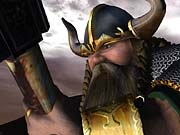
Robin Dews: The idea behind Warhammer Online started out as a random conversation between Karl Jeffery, the CEO of Climax, and Jon Gillard, Games Workshop's business development manager at E3 a couple of years back. From the initial "We should do something together, you know..." came the idea that we could create some kind of persistent online game based on the Warhammer world. However, we realized at the outset that operating such a game would involve a detailed array of design, development, management, and business skills, and so Warhammer Online Ltd. was set up as a joint venture company to bring together the best skills of Climax and Games Workshop in a single entity.
What was the question again? Oh yes, RTS or RPG! Sort of both, sort of neither. We started out thinking we could do a "massively multiplayer online battles game" and actually came up with a design that would work pretty well. However, the problems in delivering a persistent world battle game are all about social engineering and not software engineering! The trick lies in how you create an experience that is challenging, edgy, and fun for the players whilst giving your new gamers a degree of protection from your hard-core, tooled-up long-termers. Although we came up with a cool idea for the game, we began to focus our attention more and more on a player-vs.-environment game that would shift in approach from an online battles game to an online adventure game, enabling us to really explore some aspects of the background that we'd only just touched on before.
Tabletop Goes Online
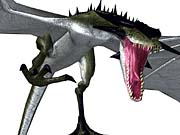
GS: What sort of influence does the experience you have with the successful tabletop games bring to Warhammer Online's development?
RD: Games Workshop has never made any bones about the fact that we are grown-ups who love to fight battles with model soldiers, and long may it be so! As a result, we understand perfectly well that a game of Warhammer is as much a social activity as a gaming activity--how can it be otherwise? You get together on a Friday night or a Saturday morning and spend the time rolling dice, arguing about rules, cheering, jeering, and generally having a good time! Although the game is clearly the focus of all this activity (and a crucial one), the time spent before the game--painting models, creating scenery, and so forth--is equally important. It's this social aspect of the gameplay that first intrigued us and drew us towards the online space. Although as gamers, we all love computer and console games, they are in essence simply Rubik's Cubes of elaborate complexity. They are products that you buy, use up, and then move on.
That "disposable product"-based approach is simply alien to Games Workshop. We build living, breathing hobbies owned by the players and not by the company. Who owns Warhammer today? The players do--the thousands and thousands of them around the world who collect, paint, and game with citadel miniatures. Games Workshop simply provides some of the tools they use to support this activity, and we're fortunate enough to be able to make our living doing something we love! Warhammer Online has grown out of this love of "social gaming." It's a game we want the player to genuinely own.
GS: What can you tell us about the setting for Warhammer Online? Details on the area and the time period? Is it a generic fantasy, such as one of Tolkien or one like EverQuest, or is it the dark, gothic fantasy of the Warhammer world?
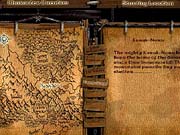
RD: The preproduction design and development of Warhammer Online has really been an extended conversation between the Games Workshop staff and the Climax staff. I think that it's also true to say that having gone through this process, we've now got a team that has a fantastic insight into the potential and possibilities of an online game set in the Warhammer world. Strange as it might sound, before we started out on this project, none of the Games Workshop staff had ever played a persistent-world online game such as EverQuest or Dark Age of Camelot. We've since made up for it, but at the outset, I think it was a real asset that we were not bound by the conventional "wisdom" of what will and will not work.
We refined it down to the area of the Reikland, which has become the focus for this game. For readers who are not familiar with Warhammer, the world is a kind of a distorted version of the "real world," currently centered on western Europe, but also including areas of Canada and North America (dark elves), South America (Lustria--home of the lizardmen), central Europe (chaos dwarves), North Africa (undead). The time period will be contemporary with the current Warhammer timeline. This is the same one we use in our Black Library fiction and comics, as well as for the tabletop battle game. It means that Karl Franz is the Emperor on the Throne in Altdorf, and the hordes of chaos are currently at bay.
Warhammer has always been rather different, and that's why it has very distinctive character and feel in this landscape of rather "generic" fantasy games. We call Warhammer a "renaissance" rather than a "dark age" world. On a superficial level, this means that it has guns, swords, and magic as its technological base rather than the traditional "sword and sorcery" fantasy settings. The European Renaissance was an incredible burst of creative and intellectual energy that completely outstripped the ability of the society to support it. It's this combination of fantastical technologies, with magic as a heretical and perilous sorcery and the merciless poverty of everyday life, that gives the Warhammer world much of its character--and makes it such a cool place to set games in!
The World of Warhammer
GS: What can you tell us about the game's visual style? Some of the imagery seems fairly graphic. Are any of the artists--those who have experience with the tabletop games--working on the project?
RD: There is a visual style that pervades everything Games Workshop does. If you look at our rule books and supplements, you'll see that there is a kind of gritty realism to the images we produce, which is born out of the inspiration of our artists. You can often see a synergy between the visual style of many computer games and that of contemporary comic books and graphic novels. To me, they appear to be drawing from a common visual lexicon, and it's not a bad way to go, as there is a dynamic to comic book art that translates well to the slightly cartoony look of most computer game graphics.
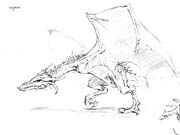
However, as you might expect, it's not where we wanted to be. The instruction to the art team was to render the Warhammer world in as "real" a fashion as their technology would allow--complete with mud, blood, filth, and decay! Seriously...our current copy line for the game is "Dark Horror and Adventure in the Warhammer World"! That pretty much sums up where we are headed. We want our players to be stunned, overwhelmed, and perhaps a little scared of the environment they find themselves in.
GS: Could you discuss the scope of Warhammer Online? What kinds of locations and inhabitants can we look forward to visiting?
RD: The area of the Reikland we're focused on extends for around 400 square kilometers. We were a bit worried at first that we wouldn't be able to get the diversity of environments that our players would demand within such a homogenous area, but that's proven not to be the case at all. We also envisioned the cities in Warhammer Online to be just that--cities and adventuring areas in their own right! In most of the other games we've looked at, the towns and cities appear to be merely trading posts where the players go to buy, sell, or bank stuff before once again heading out to the wilderness to butcher a few more defenseless creatures. We wanted to make the cities large and complex enough for the players to spend weeks in or even months exploring them. The towns and cities are also the focus of our skill and career system. Here, you can get a job--rat catcher, beggar, sewer jack, and so on--and build a little fame, wealth, and renown before you risk your neck in the wider world.
It's the spaces between them--where law and order no longer exist and where orcs, beastmen, mutants, outlaws, and cultists pray on the weak--that you really don't want to venture into alone! Many of the locations will be familiar to fans of the battle game or Warhammer Fantasy Role-Play (WHFRP), as well as readers of our novels and comics. For example, we intend to create both Blood Keep and Castle Drachenfels, complete with their subterranean dungeons and catacombs. They will both be located in the Grey Mountains, but I'd advise players to up their survival skills a little before venturing out that way!
GS: So what causes the conflict in the Warhammer world? What sorts of enemies will players encounter in these lands?
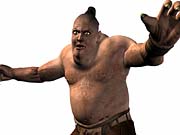
RD: The big back story behind the Warhammer world is that ever since the warp gates at the poles of the world collapsed, chaos energy in ethereal form--as the winds of magic, and in condensed form as Warpstone--has been pervading the world. The constant exposure to the warping effects of chaos has led to a world that teeters on the brink of collapse. It's a medieval world where civilization barely survives but is assailed on all sides by mutants, deviants, and cultists who wish to accelerate what they see as the inevitable triumph of chaos. Witch-hunters and religious zealots stalk the land--rooting out and torturing deviants but also terrorizing and persecuting the very populations they purport to defend. It's not a nice place!
Expect to encounter tribes of Warhammer orcs, goblins, and beastmen, as well as a whole range of creatures large and small--trolls, rat ogres, wyverns, and so on. You should also expect these creatures to behave in as intelligent a way as we can make them. We don't intend to have our orcs simply wandering around the landscape, waiting for a passing adventurer to hack them down, or standing idly by while one of their mates gets butchered! Wolves will travel in packs, and we expect our hunters to suddenly find themselves the hunted!
Heroes Don't Hunt Snakes
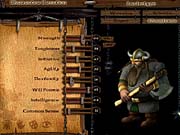
GS: So what types of characters will players be able to create to face off against these threats? Will career choices affect your role in the Warhammer world greatly?
Matt Sansam: Initially, players will be able to choose to be humans, high elves, dwarves, halflings, or ogres. As time goes on, we'll be looking to expand this choice to include the racial variants, such as Bretonnians or wood elves. Once players have chosen a race and determined their statistics, it's entirely up to them which career path they wish to follow. Obviously, there are some restrictions--the dwarves are never going to let an elf learn how to become a runesmith--but generally, most career choices are open to most characters.
That said, there are some career choices that will have a direct effect on what you can do later on down the line. For example, becoming a witch means it's unlikely that the witch-hunters will welcome you with open arms. Well, they might...but you should probably start running if that happens! However, most of those restrictions can be overcome with some hard work. It's entirely possible for you to repent and attempt to improve your standing with the witch-hunters through a serious of tough quests. However, this really will not be a trivial thing, so when you embark on a career, you should be sure that the path you have chosen is the right one for you. Don't worry, though--not all careers are like that. Joining the rat catchers is unlikely to upset too many people.
GS: So how does character advancement work using the skill-based system?
MS: While Warhammer is essentially a skill-based system, we do still have levels for the player to advance. These levels are in fact a measure of how famous they are within the Warhammer world. Hunting down snakes in the woods, while helping characters improve their skills, won't actually earn them any glory or improve their level. However, hunting down the nearby tribe of orcs that has been troubling the local farmers probably will. Killing the zombie dragon that has been rampaging across the countryside, eating the peasants, will definitely help make you famous. Assuming you survive, of course.
GS: How do combat and character death work?
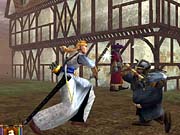
RD: One of the absolute characteristics of combat is that the outcome is largely unpredictable. We wanted to get away from the "safe bet" combat systems that allow you to "consider" a creature to evaluate its strength and then get a text message to tell you whether you are likely to win or not! We're looking for a much more "organic" approach where your in-game knowledge and experience begins to inform your ability to evaluate the outcome of a combat. The AI team is working on routines to ensure that our "monsters" will not stand idly by while their mates get chopped up by passing adventurers! General weapon skills, such as sword, club, and knife, will be available to all players. On top of that, they will be able to learn more specific skills within the career system. A period spent with the Altdorf city guard will allow you to learn pole-arm or pistol shooting, but if you want to master muskets, you'll have to train with the Hochland Long Rifles. On top of these advanced skills, we have a system of combat techniques that players can learn and call upon in specific circumstances.
Taken together, these elements combine to make a combat system that will be edgy, risky, and dangerous! We wanted something more than the players simply hitting the auto-attack button and then sitting back with a cup of tea. The fact that we are working primarily with a skill-based system means that we also can't simply keep piling on a few more hit points. The key to survival in the Warhammer world lies in training, developing, and honing your combat skills--and what could be more fun than that?
[We've had] long debates about this one, but player death will be handled through incapacitation and movable revival points. Some of the details of experience loss through death, as well as equipment loss, still need to be worked out, but we're unlikely to do anything radical here. Player characters need to be treated with the greatest respect, just like your real-life friends!
Chaotic Sorcery
GS: We saw some early screenshots from the game and noticed animals and what appeared to be henchmen. Will these be in the game?
MS: Players will be able to buy and own a variety of animals, such as cats and dogs, as well as horses. These "pets" can be used in a variety of ways, from guard dogs that help protect the character from attack to riding horses that help players cover long distances in a shorter period of time. In addition, certain NPCs will join players for some missions and help them achieve a specific goal.
GS: What about grouping? Will players be able to create armies and war bands?
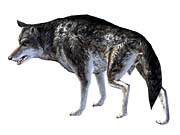
MS: That's entirely up to the players themselves. There are many areas that players can wander around and explore, but once they head out into the wilderness, it's a good idea to team up with some other players for mutual protection.
GS: What will the magic system be like?
MS: Magic in the Warhammer world works in a very different way than in other fantasy game settings. All magic in the world stems from chaos itself. Magical energy enters the world from the shattered warp gates at the planet's poles and streams across the landscape, altering and affecting everything it comes into contact with. It's this magical energy that causes chaos monsters and other dark horrors to exist, and it's also this energy that spellcasters tap into to cast their spells.
Wizards in the Warhammer world cast spells by channeling magical energy directly from their surroundings. This means that magic-using characters and creatures do not have an inherent pool of "mana" to draw from, but instead tap into these winds of magic and channel the ambient power through themselves. Once that magical energy has been tapped by a wizard, it is gone, and it will need to be replenished with the passage of time.
In terms of Warhammer Online, we keep track of many different values to help us simulate these winds of magic. For any given area of the gameworld, we know both the maximum possible magical field strength as well as the current rate at which the field is refilling. By varying those numbers, we can create a wide variety of effects and have areas where the magic is strong but refills slowly or where the magic field is very small but refreshes very quickly--or any other combination we like.
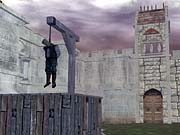
In addition to the winds of magic, various other things have an effect on the magical field strengths. Standing stones help focus the magical energies and will add to the rate at which an area refills. The moons of the Warhammer world have a large effect on the size of the magical fields themselves, as well as the fill rates, which means that magic in the world will vary with each lunar cycle. The good news is that characters with witch sight will be able to see these field strengths and use that knowledge to their advantage.
Spells themselves require a set amount of magical energy to cast, and any specific spell will always cost the same amount of power, whether a novice or a master is casting it. The difference comes in the amount of time a spellcaster takes to actually cast that spell. Let me give you an example. If a fireball spell requires 100 power to cast, and a novice wizard can channel and focus one point of power per second, it's going to take him 100 seconds to cast. If a master wizard can channel 10 points of power per second, then that same spell will take him only 10 seconds.
More About Magic
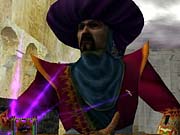
However, channeling this power has its price. Spellcasters take damage every second that the magical energies are passing through them. Going back to my previous example, the novice wizard is going to get badly hurt when he casts that fireball spell, as it takes him a long time to focus the energy. The master wizard probably won't even think twice, although casting that fireball over and over again is really going to take it out of him. This also means that there's nothing stopping a novice wizard from trying to cast a very powerful spell, as long as he can find some way to survive the experience.
Oh, and there's one more thing that any potential mage should bear in mind. Generally, this focusing and channeling of magical energy is not 100 percent efficient. The higher your skill, the better you are, but it's never totally perfect. What this means is that when a character attempts to cast that fireball, he's actually drawn more than 100 points of power from the environment and just used 100 to power his spell. This extra magic, or wild magic as we're calling it, doesn't just disappear. It gets tracked, and once it builds up to certain levels, unpredictable and usually dangerous things occur. Demons are drawn to this buildup of power, and when the wild magic reaches a certain level, there's a good chance that one will draw on that wild magic pool and manifest itself. Random spells will be triggered and cast using the wild magic as a power source. Basically, magic in the Warhammer world is a dangerous thing to mess around with, but as long as you're prepared for the risks, the rewards are great.
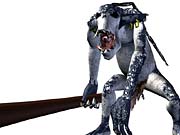
There are a lot more aspects to the magic system that I could go into, but here are some particulars. The winds of magic are actually divided into eight colors, and wizards can learn to draw from one color specifically. Drawing the magical energy from an area is actually a good tactic when facing a magic-using monster. Several magic users can join together and use rituals to help channel the magical energies faster. Scattered throughout the world are pieces of warp stone. This material is essentially raw magic condensed into solid form, and foolhardy wizards can use it to power their own magic. Lastly, channeling magic all over the place is generally not something that the populous of Warhammer approve of and is likely to get you burnt at the stake if you're not careful.
GS: You've announced that the "evil" races of the Warhammer world, such as the skaven, lizardmen, and orcs, won't be playable. Why was this decision made?
RD: As I've said elsewhere, this was really a very difficult decision. We knew that many Warhammer fans would love to be able to play an orc or skaven gray seer as their character, but once we'd made the switch to a player-vs.-environment game, it was inevitable. The only way we could have made this work would have been to have some kind of team player-vs.-player system, like in World War II Online or Dark Age of Camelot. Within the context of the Warhammer World, it simply would not have been credible to have an orc turn up in Altdorf, buy supplies, or go off adventuring with a party of humans, elves, and dwarves!
"Wouldn't It Be Cool If..."
One of our design principles has been that players don't have to be "good." We have a very subtle system of tracking the relationship between the players and all other NPC entities in the game, a value we call "standing." If you really want to go out there and study at the Amethyst College, learn the "lore of death" and then split with the program and become a necromancer. And be aware that the witch-hunters will be on your trail and that you'll find life anywhere, but the most out-of-the-way locations will become very hard for you (but never mind...you can always raise a few dead bodies to be your mates!).
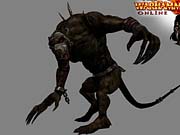
Finally, we are actually currently modeling the skaven as in-game entities but intend to reserve them for GMs' and game designers' use. This backs up the secretive and clandestine nature of the skaven and the way that they operate in the Warhammer world. It also means that if players ever encounter a skaven in the gameworld--in the sewers under Altdorf or the swamps around Marienburg--they'll know that this is no simple AI drone, but a real intelligence looking back at them and ready to react!
GS: From what you're telling us, it appears that Warhammer Online is being designed from the ground up as an online experience, as opposed to a translation of the tabletop game. Were there many gameplay influences from the new sixth edition rules?
RD: The simple answer is no! As I've said, we're in a very different place for a tabletop game, where the players are fighting a battle using dice, tape measures, and model soldiers on a landscape that varies with their collections. The rules you need to describe the myriad of situations that can occur on the tabletop are quite different from the structure you need to facilitate an online game.
The big similarity between the two arenas--tabletop and online--is that in both sets of circumstances, you are attempting to provide your players with a framework within which they can explore your world--a sandbox, not a sand castle! Make the game too tight, and there is no creativity for the players. Leave it too loose, and you are wide open to exploits and abuse--it's a subtle and difficult tightrope to walk. If I can guarantee one thing to you today, it's that we will get this balance wrong in places, and once we go live, we'll have to go in and patch! Just like day follows night!
GS: Are there any plans in the works to expand upon the areas already confirmed in Warhammer Online?
MS: Absolutely. We are developing a good, solid set of tools right now, which will also let us easily add new content at a later date. That said, we're already committed to creating a huge area of the Warhammer World, so I want to get that finished and get people playing the game before promising any specific extras.
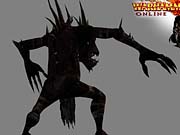
Also, we've been very careful about the setting of our gameworld and the timeline. This means that you won't be able to explore Mordheim, as the destruction of that city happened more than 500 years ago. However, there's nothing stopping us from creating a similar situation and giving players a chance to explore. Mind you, Rick and Robin did seem a little nervous when I asked about hitting Altdorf with a comet, so maybe not...
RD: The only answer I can give is yes, but...! The big "but" is that right now, we've got a game to deliver and a million and one things to think about. Every time we sit down and talk, read through the forums, and chat with fans at conventions, we all say, "Wouldn't it be cool if..."
As Rick put it, "Games are made by what's left after you've thrown the rubbish away!" We think we've left our players with an exciting, entertaining, and sociable online gaming space, and we've made the online game that we always wanted to play! Let's hope that you all agree...
GS: Thanks for your time, gentlemen.
Got a news tip or want to contact us directly? Email news@gamespot.com
Join the conversation